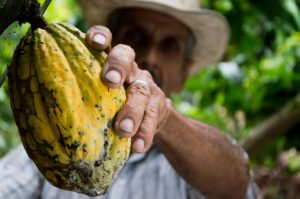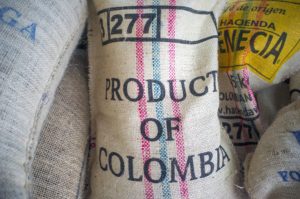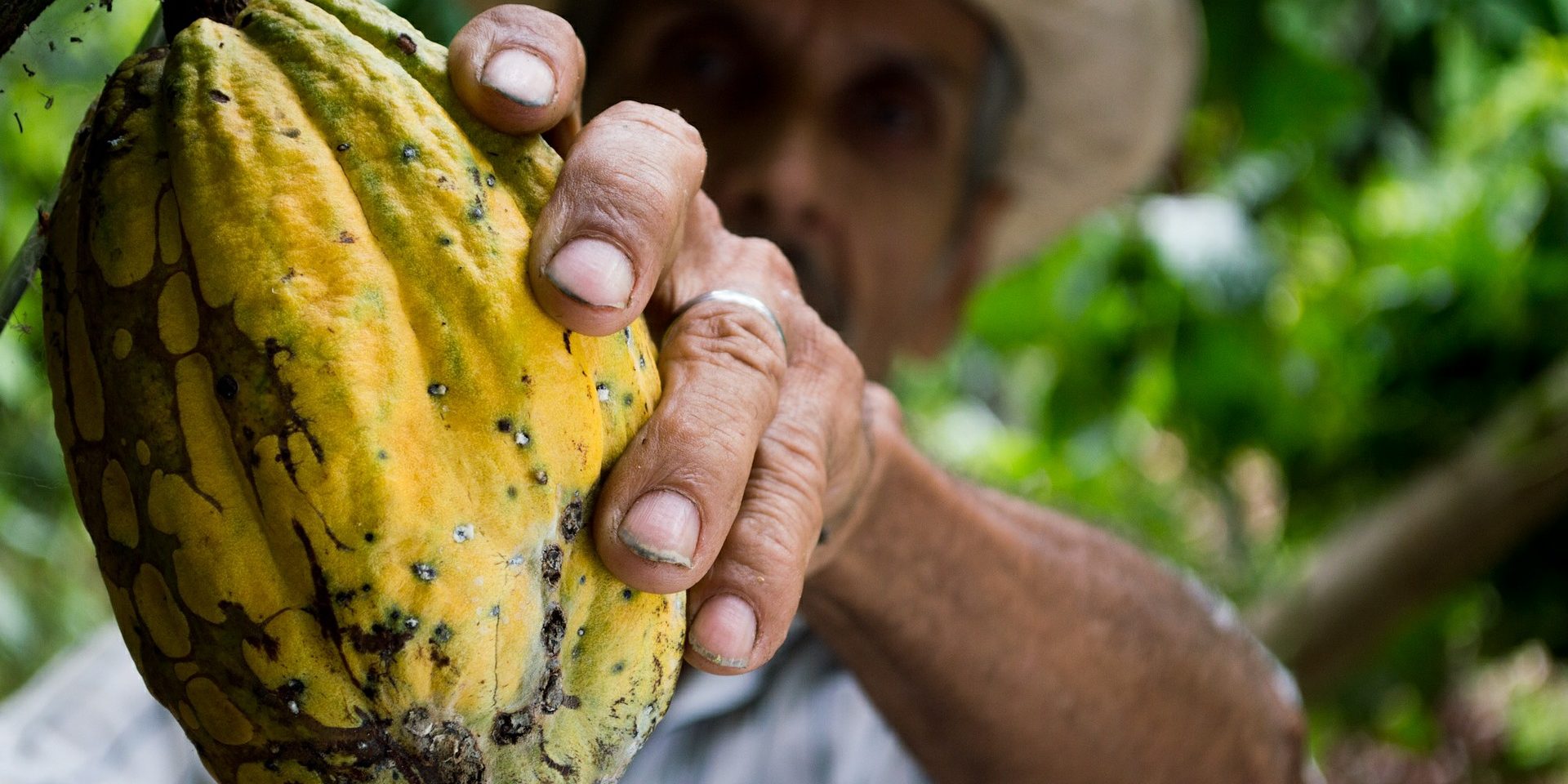 Home to huge expanses of biodiverse forest and endemic species, Colombia’s battle against deforestation is crucial, and it is one of the top environmental concerns of the country. Recovering from political and economic instability, more people have been relocating into rural areas and clearing land for agriculture, mining, and more, greatly increasing Colombia’s rates of deforestation. Studies have found that there was a “46 percent rise [in deforestation] compared to 2016, and more than double the rate of loss from 2001-2015.” Luckily, Colombia is aware of the problem, and is actively taking steps towards sustainability and environmental conservation, starting with an especially sweet solution: chocolate.
Home to huge expanses of biodiverse forest and endemic species, Colombia’s battle against deforestation is crucial, and it is one of the top environmental concerns of the country. Recovering from political and economic instability, more people have been relocating into rural areas and clearing land for agriculture, mining, and more, greatly increasing Colombia’s rates of deforestation. Studies have found that there was a “46 percent rise [in deforestation] compared to 2016, and more than double the rate of loss from 2001-2015.” Luckily, Colombia is aware of the problem, and is actively taking steps towards sustainability and environmental conservation, starting with an especially sweet solution: chocolate.
On July 17th, Colombia became the first Latin American country to sign the Cocoa, Forests and Peace Initiative, which aims “to increase the productivity of high quality cocoa without deforestation.” With a goal to end deforestation from cocoa production by 2020, this initiative has massive potential to lead Colombia on a path toward sustainable agriculture practices that will decrease national levels of deforestation and encourage eco-friendly methods. Along with cutting down deforestation, the Colombian government hopes to “restore degraded landscapes” and promote “the development of rural areas with a comprehensive and sustainable vision.”
 Many leading companies have joined in to support the Initiative, including two of Colombia’s biggest cocoa producers, Casa Luker and Compañía Nacional de Chocolates. Along with ending deforestation, Casa Luker has a mission to have “cleaner production” by reducing the use of natural resources and promoting energy efficiency. Compañía Nacional de Chocolates has been leading the chocolate industry in Colombia since 1920 and is dedicated toward sustainability and tackling climate change. Their mission statement claims that they’re “committed to social development, reducing the environmental impact of our operations and products, and implementing strategies in accordance to the United Nations Sustainable Development Goals to generate well-being and encourage progress in the communities where we work.” They do this by utilizing solar panels for green energy and focusing on reducing the use of water, resources, and limiting waste. These two companies are paving the way for smaller Colombian businesses as well as chocolate companies around the world to see success through sustainability.
Many leading companies have joined in to support the Initiative, including two of Colombia’s biggest cocoa producers, Casa Luker and Compañía Nacional de Chocolates. Along with ending deforestation, Casa Luker has a mission to have “cleaner production” by reducing the use of natural resources and promoting energy efficiency. Compañía Nacional de Chocolates has been leading the chocolate industry in Colombia since 1920 and is dedicated toward sustainability and tackling climate change. Their mission statement claims that they’re “committed to social development, reducing the environmental impact of our operations and products, and implementing strategies in accordance to the United Nations Sustainable Development Goals to generate well-being and encourage progress in the communities where we work.” They do this by utilizing solar panels for green energy and focusing on reducing the use of water, resources, and limiting waste. These two companies are paving the way for smaller Colombian businesses as well as chocolate companies around the world to see success through sustainability.
By joining the Cocoa, Forests and Peace Initiative, the “Colombian Government, the National Federation of Cocoa Producers and signatory companies and partners” have agreed to a “Framework of Action” that ensures the end of deforestation and works to rebuild what has been lost or damaged. This Framework of Action is made up of 11 “core commitments” to:
- “Prevent activities that cause or contribute to any further deforestation or forest degradation in the cocoa sector
- Ensure cocoa production takes place in accordance with the country’s environmental land use planning, assessment of soil aptitude and the delimitation of the agricultural frontier
 Respect the rights of cocoa farmers, including identifying and mitigating social risks, and sequencing the implementation of actions to minimize potential adverse social and economic impacts
Respect the rights of cocoa farmers, including identifying and mitigating social risks, and sequencing the implementation of actions to minimize potential adverse social and economic impacts- Promote the effective restoration and long-term conservation of protected areas, as well as areas of special environmental interest, including forests and ecosystems within or adjoining the cocoa landscape
- Implement agreed actions in the context of a broader landscape-level approach, making strong links with similar initiatives in other commodities, and in full alignment with the nation’s Comprehensive Strategy to Control Deforestation and Sustainably Manage Forests (‘Forests, Territories of Life’), the Tropical Forest Alliance 2020 Colombia, the 20×20 Initiative led by WRI, the WEF New Vision for Agriculture, and other relevant national strategies and plans
- Jointly establish a process of participatory dialogue with multiple stakeholders interested in key elements of the Agreement, to develop effective implementation plans and foster shared learning and knowledge exchange
- Contribute to the implementation of the Final Peace Agreement, through its Implementation Plan for points 1 and 4, with a particular focus on the Peace Agreement’s provisions concerning Integrated Rural Reform, ensuring the closure of the agricultural frontier, adequate use of the soil, and the protection of strategic ecosystems.
- Monitor levels of forest cover associated with cocoa plantations as a foundation for decision-making regarding conservation and management.
- Provide effective monitoring and reporting on progress on commitments and actions to ensure transparency and accountability.
- Communicate the concept of zero deforestation cocoa in the national and international market and raise awareness among different actors in the supply chain on the relevance and impact of zero deforestation in regard to the provision of environmental services, strengthening the quality of life of cocoa producers, increasing the climate resilience of the cocoa sector, and ensuring greater access to markets.
- Provide support to sustainable markets for cocoa products that contribute to the restoration and protection of natural forests.”
 The Framework also lays out three areas of priority, including “cocoa for the protection and restoration of forests,” “sustainable production and improved livelihoods for cocoa producers,” and “community engagement and social inclusion in the cocoa sector.” The Cocoa, Forests and Peace Initiative is truly trying to make a positive social and economic impact along with fighting deforestation and promoting sustainable practices.
The Framework also lays out three areas of priority, including “cocoa for the protection and restoration of forests,” “sustainable production and improved livelihoods for cocoa producers,” and “community engagement and social inclusion in the cocoa sector.” The Cocoa, Forests and Peace Initiative is truly trying to make a positive social and economic impact along with fighting deforestation and promoting sustainable practices.
Juan Guillermo Zuluaga, Colombia’s Minister of Agriculture and Rural Development stated, “in a market characterized by a growing interest in zero-deforestation cocoa, with a positive story to tell about forests and peace, we hope Colombia’s signing up to the Cocoa and Forests Initiative will encourage greater interest and investment in the Colombian cocoa supply chain.” Colombia hopes to further develop the local cocoa industry, providing a needed economic and employment boost, all while upholding sustainable standards to aid environmental conservation efforts. Zuluaga has called cocoa the “cultivation of peace,” and now both consumers and businesses have a chance to be a part of this new environmental and social justice movement. Chocolate is always delicious, but knowing that your chocolate promotes peace and sustainability gives the consumer a new level of satisfaction.
Written by: Katie Cohen
References:
Cocoa & Forests Initiative. (2018). Cocoa, Forests and Peace Initiative in Colombia – Joint Framework for Action. Retrieved from https://www.idhsustainabletrade.com/uploaded/2018/07/Colombia-Cocoa-Forests-and-Peace-Initiative-Joint-Framework-for-Action-English.pdf
Compañia Nacional de Chocolates. (n.d.). Sustainability. Retrieved from https://www.chocolates.com.co/en/sustainability/
MinAgricultura se une a iniciativa Cacao, Bosques y Paz. (2018, July 17). Retrieved from https://www.minagricultura.gov.co/noticias/Paginas/MinAgricultura-se-une-a-iniciativa-Cacao,-Bosques-y-Paz.aspx
Mongabay. (n.d.). Colombia. Retrieved from https://rainforests.mongabay.com/deforestation/archive/Colombia.htm
SOSTENIBILIDAD | CasaLuker – Más de un siglo de aroma y sabor. (n.d.). Retrieved from https://www.casaluker.com/sostenibilidad
Weisse, M., & Goldman, E. D. (2018, June 26). 2017 Was the Second-Worst Year on Record for Tropical Tree Cover Loss. Retrieved from https://www.wri.org/blog/2018/06/2017-was-second-worst-year-record-tropical-tree-cover-loss
World Resources Institute. (2018, July 17). RELEASE: Colombia Becomes First Country in Latin America to Commit to Deforestation-Free Chocolate. Retrieved from https://www.wri.org/news/2018/07/release-colombia-becomes-first-country-latin-america-commit-deforestation-free








TornadoCash: Your gateway to anonymous transactions on Ethereum. Keep your financial activities private with this decentralized mixer
I have read your article carefully and I agree with you very much. This has provided a great help for my thesis writing, and I will seriously improve it. However, I don’t know much about a certain place. Can you help me?